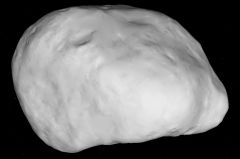Weywot
| Weywot | |
|---|---|

| |
| Weywot from Quaoar2.zip in Orbiter 2006P1 | |
| Designation | |
| Name | Weywot |
| Reference body | 50000 Quaoar |
| Planetary mean orbits | |
| Epoch | 2004.55 |
| Semimajor axis (a) | 35000000 m |
| Eccentricity (e) | 0.002 |
| Inclination (i) | 0.984° (0.0171740398396242 radian) |
| Longitude of the ascending node (LAN, ☊) | 188.799° (3.29516417447277 radian) |
| Longitude of periapsis (ϖ) | 155.925° (2.72140463617216 radian) |
| Mean longitude (L) | 4.170003° (0.0727802821680411 radian) |
| Selected physical parameters | |
| Mean radius | 225000 m |
| Mass | 2×1020 kg |
| Rotation elements | |
| SidRotPeriod | 348094 seconds (4.0289) |
| SidRotOffset | 0 |
| Obliqutiy | 0.0388 |
| LAN | 2.752 |
| Note | *Elements given are from Weywot.cfg (Quaoar2.zip) |
Weywot (50000 Quaoar I, S/2006 (50000) 1 is a natural satellite of the Dwarf planet 50000 Quaoar located in the Kuiper Belt. It was discovered by Michael E Brown in February 2006 using images from Hubble. It was named Weywot, son of Quaoar from the Tongva mythology.
Weywot in Orbiter
Weywot were first introduced with the release of MainBeltAsteroids051403.zip in May 2003.
Note that the landing surface as given in the config file is spherical, but the visual of these bodies are not, if you land, you will likely be above or below the visual surface.
| Add-on | Source | Version | Author | Type | Release Date | Compatibility | Wiki article |
|---|---|---|---|---|---|---|---|
| Quaoar | O-F Resources | 2009-11-26 | Unknown OHM Addon Developer | Scenery | 26 November 2009 | ||
See also
Gallery
Quaoar and Weywot imaged by Hubble in December 2022
from Wikimedia Commons
| edit The Solar System | |
|---|---|
| Central star |
Sun (Sol) |
| Planets |
Mercury - Venus - Earth - Mars - Jupiter - Saturn - Uranus - Neptune |
| Natural satellites |
Moon - Phobos - Deimos - Io - Europa - Ganymede - Titan - more... |
| Add-ons |
Planets - Dwarf Planets - Small objects - Natural satellites - Alternative star systems |


